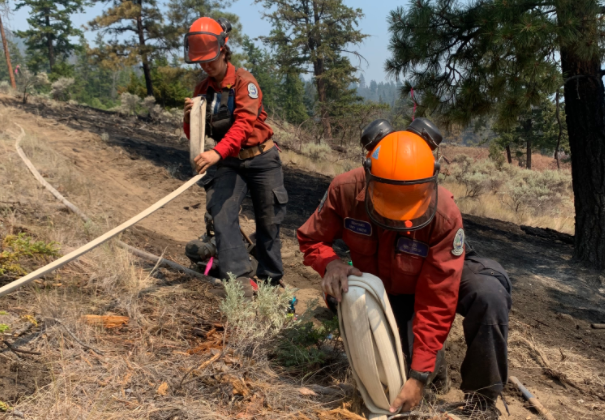A pair of University of Northern BC (UNBC) researchers have begun to look into the long-term, occupational health impacts of wildland fire fighters, and how to help mitigate those impacts
“With longer fire seasons and more intense fire activity, we see a growing number of personnel participating in direct fire suppression and indirect fire suppression,” said UNBC Research Associate Katie Cornish.
“Given these circumstances, there’s this mounting urgency to understand, prevent, and mitigate the occupational health impacts that are associated wildland fire suppression.”
Cornish, along with Dr. Chelsea Pelletier of UNBC, conducted a study, reviewing existing literature on health impacts wildland firefighters face.
She says the goal of the study was to identify the occupational exposure to wildland fire on physical, emotional and mental health, as well as examine the characteristics and the effectiveness, prevention, and possible management strategies to reduce negative health outcomes.
“We conducted a scope interview of previous studies, and we also conducted surveys and interviews with wildland firefighters and people working in related roles with the BC Wildfire Service,” Cornish explained.
“What we found from our scope interview is we had 101 different academic journal articles, and that included government and organizational documents that described the health outcomes that wildland firefighters may experience while on the job.”
The outcomes were organized into categories:
- Acute injuries and fatalities,
- Mental health,
- Respiratory health and lung function,
- Inflammation and oxidative stress,
- Fatigue and sleep,
- Hydration,
- Cardiovascular,
- Temperature regulation,
- Hearing,
- Nutrition.
“We found that most of the literature only looked at short-term outcomes, this means they measured changes across a single day or a single shift,” Cornish said.
“Most of the research was conducted on wildland firefighters specifically, so crews that work on the ground in the front line of fire suppression, and actually excluded other personnel, like the aviation crews, equipment operators, and the incident management teams.”
Cornish added that five of the studies that looked at the risk of exposure, and how that risk could potentially be reduced.
The studies examined:
- Potential usage of masks to reduce smoke and particulate inhalation.
- Advanced hygiene protocols to reduce skin exposure.
- Fluid intake to manage hydration and core temperature.
- Glutamine supplementation to reduce fatigue
“To gain a better understanding of the lived experiences of wildland firefighters and other personnel, we also conducted surveys to rank and rate health research priorities to find out what was most important to workers,” Cornish added.
According to Cornish, the five most important priorities were:
- Effects of smoke inhalation on respiratory health
- Fatigue and sleep
- Mental health impacts
- Stress
- Long term risk of disease
“Through interviews with staff, we found that understanding the dynamic risk environment was important, and so is the organizational fit of potential mitigation strategies,” Cornish said.
“We found that workers agreed with the identified research priorities, and expressed excitement about future research possibilities.”
However, because there were only five studies found that studied how to mitigate the impacts, Cornish says there’s still plenty of research to be done.
“In the future, thinking of some of the practical applications for this research, we would like to see more research specifically looking at longitudinal studies, so multi-year, long-term studies, that would prioritize worker health, instead of studies that are short-term,” she explained.
Cornish said they’re hoping to continue their research in the future.
“Dr. Chelsea Pelletier is the primary investigator on this project, so in her lab, we have done a number of projects in partnership with the BC Wildfire Service,” Cornish said.
“Now we have a graduate student who is specifically starting her Masters thesis looking at mental health in wildland fire fighters, so this project has kind of been a catalyst or a stepping stone to pave the way for research in the field.”
Something going on in the Cariboo you think people should know about?
Send us a news tip by emailing [email protected].








